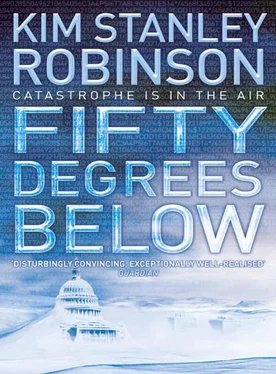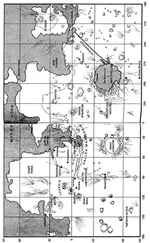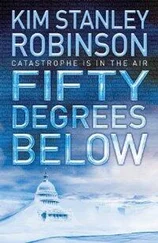Chessman suddenly blew in on the left flank and Frank resigned, shaking his head as he paid up. ‘Next time,’ he promised. The fire guttered out, and the food and beer were gone. The potatoes smoldered on a table top. The guys slowed down in their talk. Redbeard slipped off into the night, and that made it okay for Frank to do so as well. Some of them made their departures into a big production, with explanations of where they were going and why, and when they would likely return again; others just walked off, as if to pee, and did not come back. Frank said, ‘Catch you guys,’ in order not to appear unfriendly, but only as he was leaving, so that it was not an opening to any inquiries.
Off north to his tree. Ladder called down, the motor humming like the sound of his brain in action.
The thing is, he thought as he waited, nobody knows you. No one can. Even if you spent almost the entirety of every day with someone, and there were people like that – even then, no. Everyone lived alone in the end, not just in their heads but even in their physical routines. Human contacts were parcellated, to use a term from brain science or systems theory; parcelled out. There were:
1) the people you lived with, if you did; that was about a hundred hours a week, half of them asleep;
2) the people you worked with, that was forty hours a week, give or take;
3) the people you played with, that would be some portion of the thirty or so hours left in a week.
4) Then there were the strangers you spent time with in transport, or eating out or so on. This would be added to an already full calendar according to Frank’s calculations so far, suggesting they were all living more hours a week than actually existed, which felt right. In any case, a normal life was split out into different groups that never met; and so no one knew you in your entirety, except you yourself.
One could, therefore:
1) pursue a project in paleolithic living,
2) change the weather,
3) attempt to restructure your profession, and
4) be happy,
all at once, although not simultaneously, but moving from one thing to another, among differing populations; behaving as if a different person in each situation. It could be done, because there were no witnesses. No one saw enough to witness your life and put it all together.
Through the lowest leaves of his tree appeared the aluminum-runged nylon rope ladder. One of his climbing friends had called this kind of ice-climbing ladder a ‘Miss Piggy’, perhaps because the rungs resembled pig iron, perhaps because Miss Piggy had stood on just such a ladder for one of her arias in ‘The Muppets’ Treasure Island.’ Frank grabbed one of the rungs, tugged to make sure all was secure above, and started to climb, still pursuing his train of thought. The parcellated life. Fully optimodal. No reason not to enjoy it; and suddenly he realized that he was enjoying it. It was like being a versatile actor in a repertory theater, shifting constantly from role to role, and all together they made up his life, and part of the life of his time.
Cheered by the thought, he ascended the upper portion of his Miss Piggy, swaying as little as possible among the branches. Then through the gap, up and onto his plywood floor.
He hand-turned the crank on the ladder’s spindle to bring the ladder up after him without wasting battery power. Once it was secured, and the lubber’s hole filled with a fitted piece of plywood, he could relax. He was home.
Against the trunk was his big duffel bag under the tarp, all held in place by bungee cords. From the duffel he pulled the rolled-up foam mattress, as thick and long as a bed. Then pillows, mosquito net, sleeping bag, sheet. On these warm nights he slept under the sheet and mosquito net, and only used his down bag as a blanket near dawn.
Lie down, stretch out, feel the weariness of the day bathe him. Slight sway of the tree: yes, he was up in a treehouse.
The idea made him happy. His childhood fantasy had been the result of visits to the big concrete treehouse at Disneyland. He had been eight years old when he first saw it, and it had bowled him over: the elaborate waterwheel-powered bamboo plumbing system, the bannistered stairs spiraling up the trunk, the big living room with its salvaged harmonium, catwalks to the separate bedrooms on their branches, open windows on all four sides …
His current aerie was a very modest version of that fantasy, of course. Just the basics; a ledge bivouac rather than the Swiss family mansion, and indeed his old camping gear was well-represented around him, augmented by some nifty car-camping extras, like the lantern and the foam mattress and the pillows from the apartment. Stuff scavenged from the wreckage of his life, as in any other Robinsonade.
The tree swayed and whooshed in the wind. He sat on his thick foam pad, his back holding it up against the trunk. Luxurious reading in bed. Around him laptop, cell phone, a little cooler; his backpack held a bathroom bag and a selection of clothing; a Coleman battery-powered lantern. In short, everything he needed. The lamp cast a pool of light onto the plywood. No one would see it. He was in his own space, and yet at the same time right in the middle of Washington D.C. One of the ferals in the ever-encroaching forest. ‘Oooop, oop oop ooooop!’ His tree swayed back and forth in the wind. He switched off his lamp and slept like a babe.
Except his cell phone rang, and he rolled over and answered it without fully waking. ‘Hello?’
‘Frank Vanderwal?’
‘Yes? What time is it?’ And where am I?
‘It’s the middle of the night. Sorry, but this is when I can call.’ As he was recognizing her voice, she went on: ‘We met in that elevator that stuck.’
Already he was sitting up. ‘Ah yeah of course! I’m glad you called.’
‘I said I would.’
‘I know.’
‘Can you meet?’
‘Sure I can. When?’
‘Now.’
‘Okay.’
Frank checked his watch. It was three in the morning.
‘That’s when I can do it,’ she explained.
‘That’s fine. Where?’
‘There’s a little park, near where we first met. Two blocks south of there, a block east of Wisconsin. There’s a statue in the middle of the park, with a bench under it. Would that be okay?’
‘Sure. It’ll take me, I don’t know, half an hour to get there. Less, actually.’
‘Okay. I’ll be there.’
The connection went dead.
Again he had failed to get her name, he realized as he dressed and rolled his sleeping gear under the tarp. He brushed his teeth while putting on his shoes, wondering what it meant that she had called now. Then the ladder finished lowering and down he went, swaying hard and holding on as he banged into a branch. Not a good time to fall, oh no indeed.
On the ground, the ladder sent back up. Leaving the park the streetlights blazed in his eyes, caged in blue polygons or orange globes; it was like crossing an empty stage set. He drove over to Wisconsin and up it, then turned right onto Elm Street. Lots of parking here. And there was the little park she had mentioned. He had not known it existed. It was dark except for one orange streetlight at its north end, near a row of tennis courts. He parked and got out.
Mid-park a small black statue of a female figure held up a black hoop. The streetlight and the city’s noctilucent cloud illuminated everything faintly but distinctly. It reminded Frank of the light in the NSF building on the night of his abortive b-and-e, and he shook his head, not wanting to recall that folly; then he recalled that that was the night they had met, that he had broken into the NSF building specifically because he had decided to stay in D.C. and search for this woman.
And there she was, sitting on the park bench. It was 3:34 AM and there she sat, on a park bench in the dark. Something in the sight made him shiver, and then he hurried to her.
Читать дальше












